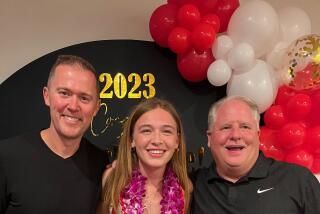Transplant Forges Bittersweet Friendship
- Share via
MISSION VIEJO — Betty Leidal and Jeff Bergan have only met once. But they think about each other often.
Betty Leidal’s 14-year-old son, David, was killed on the morning of Sept. 20, 1988, when he was hit by a car. One of his kidneys was transplanted to Jeff Bergan, a part-time wrestling and football coach at Mission Viejo High School who was suffering from failing kidneys and a strained heart.
Now, Bergan, 28, once too weak to even get out of bed, has been pronounced healthy by his doctors. He is going to pursue his bachelor of arts degree, a goal that he had all but given up. He says he can now think about his future.
“With my kidneys failing and all, I felt everything was taken away from me,” Bergan said recently. “I had no energy to do anything. Now I’m back to normal again.”
Leidal is still trying to cope with the death of her youngest son. A lawsuit has been filed against the driver, who was 17 at the time, and five other students who were passengers in the car that hit her son, as well as their families. As the director of the UCI Foundation, Leidal has kept herself busy. But while the numbness and shock resulting from her son’s death have worn off, she said she still feels the pain.
“I see David’s friends are growing up,” Leidal said. “Some of them are six feet tall and are just starting to grow whiskers on their faces. My David was frozen in time, his voice hadn’t even changed.”
David had played freshman football at University High School. He was number 79, a good-humored boy who played the cello but loved rock and roll.
Leidal said the toughest day she has suffered since David’s death was the first anniversary of the accident. In September, she flew to visit her older son, Erik, a student at Rice University in Houston. When she came back, the emotional weight of David’s death seemed heavier than ever.
“It hits you hard,” Leidal recalled. “You know his death is really forever. He’s never coming back. He’s never going to make it to college.”
Leidal said she hopes Bergan will succeed in whatever he wants to do.
It is rare for the recipient of a transplant to know the donor or his family, medical officials say. Bergan and Leidal found each other by cruel chance. Bergan, who had waited for a kidney transplant for more than two years, had been featured in several articles in The Times in 1988, including one that was printed a day before David was killed. David and his mother read the article and even talked about it. The next day, David was dead.
“When you’re dealing with something so horrible, you keep thinking that there’s got to be something good in it. I just knew I had to donate his organs. I remembered the story about Jeff and I thought that David would want so bad to help him,” Leidal said.
Leidal was told she might not have enough time to find Bergan or that even if she found him, his blood type might not match her son’s. But the search for the ailing coach gave Leidal a purpose, something she could hold onto. The next day, hospital officials found Bergan, whose blood type matched perfectly. The ailing coach received one of David’s kidneys in a 2 1/2-hour operation. Nine days later, he was recovering at home.
David’s corneas, his liver and the other kidney were donated as well. Leidal does not know any of the other recipients.
Bergan and Leidal met each other for the first and only time a month after the operation. The meeting was hard for both of them.
“What do you say to a mother whose son died and now I’m living because of him?” Bergan asked.
He said he told her he was grateful. He told her that he couldn’t thank her enough. And he told her that he was not only living for himself now, he was living for David, too.
“It was beautiful, very special. I know David is alive in a way through Jeff,” Leidal said.
Bergan and Leidal both said that they want to know each other better. But both know that seeing each other again could be painful. For now, they keep in contact through a mutual friend. And Bergan’s mother and Leidal exchange letters.
Bergan talks about David when he is asked to speak in Mission Viejo High School biology classes about his experience. He tells them that the 14-year-old boy saved his life.
“People ask me how I am and how my kidneys are treating me. I always tell them, ‘We’re fine.’ It’s the truth, I have part of her son in me and we’re both doing fine,” Bergan said.


